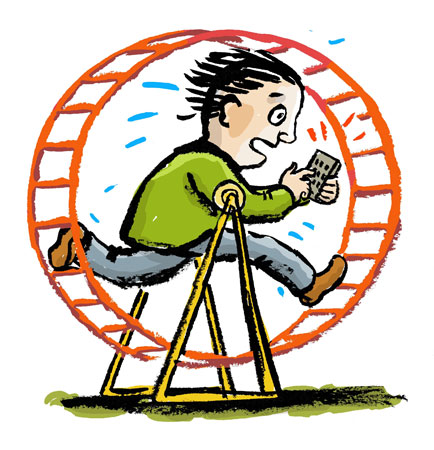 Slate | "The brain seems to be more stingy with mechanisms for pleasure than for desire," Berridge has said. This makes evolutionary sense. Creatures that lack motivation, that find it easy to slip into oblivious rapture, are likely to lead short (if happy) lives. So nature imbued us with an unquenchable drive to discover, to explore. Stanford University neuroscientist Brian Knutson has been putting people in MRI scanners and looking inside their brains as they play an investing game. He has consistently found that the pictures inside our skulls show that the possibility of a payoff is much more stimulating than actually getting one.
Slate | "The brain seems to be more stingy with mechanisms for pleasure than for desire," Berridge has said. This makes evolutionary sense. Creatures that lack motivation, that find it easy to slip into oblivious rapture, are likely to lead short (if happy) lives. So nature imbued us with an unquenchable drive to discover, to explore. Stanford University neuroscientist Brian Knutson has been putting people in MRI scanners and looking inside their brains as they play an investing game. He has consistently found that the pictures inside our skulls show that the possibility of a payoff is much more stimulating than actually getting one.Just how powerful (and separate) wanting is from liking is illustrated in animal experiments. Berridge writes that studies have shown that rats whose dopamine neurons have been destroyed retain the ability to walk, chew, and swallow but will starve to death even if food is right under their noses because they have lost the will to go get it. Conversely, Berridge discovered that rats with a mutation that floods their brains with dopamine learned more quickly than normal rats how to negotiate a runway to reach the food. But once they got it, they didn't find the food more pleasurable than the nonenhanced rats. (No, the rats didn't provide a Zagat rating; scientists measure rats' facial reactions to food.)
That study has implications for drug addiction and other compulsive behaviors. Berridge has proposed that in some addictions the brain becomes sensitized to the wanting cycle of a particular reward. So addicts become obsessively driven to seek the reward, even as the reward itself becomes progressively less rewarding once obtained. "The dopamine system does not have satiety built into it," Berridge explains. "And under certain conditions it can lead us to irrational wants, excessive wants we'd be better off without." So we find ourselves letting one Google search lead to another, while often feeling the information is not vital and knowing we should stop. "As long as you sit there, the consumption renews the appetite," he explains.
Actually all our electronic communication devices—e-mail, Facebook feeds, texts, Twitter—are feeding the same drive as our searches. Since we're restless, easily bored creatures, our gadgets give us in abundance qualities the seeking/wanting system finds particularly exciting. Novelty is one. Panksepp says the dopamine system is activated by finding something unexpected or by the anticipation of something new. If the rewards come unpredictably—as e-mail, texts, updates do—we get even more carried away. No wonder we call it a "CrackBerry."
The system is also activated by particular types of cues that a reward is coming. In order to have the maximum effect, the cues should be small, discrete, specific—like the bell Pavlov rang for his dogs. Panksepp says a way to drive animals into a frenzy is to give them only tiny bits of food: This simultaneously stimulating and unsatisfying tease sends the seeking system into hyperactivity. Berridge says the "ding" announcing a new e-mail or the vibration that signals the arrival of a text message serves as a reward cue for us. And when we respond, we get a little piece of news (Twitter, anyone?), making us want more. These information nuggets may be as uniquely potent for humans as a Froot Loop to a rat. When you give a rat a minuscule dose of sugar, it engenders "a panting appetite," Berridge says—a powerful and not necessarily pleasant state.
If humans are seeking machines, we've now created the perfect machines to allow us to seek endlessly. This perhaps should make us cautious. In Animals in Translation, Temple Grandin writes of driving two indoor cats crazy by flicking a laser pointer around the room. They wouldn't stop stalking and pouncing on this ungraspable dot of light—their dopamine system pumping. She writes that no wild cat would indulge in such useless behavior: "A cat wants to catch the mouse, not chase it in circles forever." She says "mindless chasing" makes an animal less likely to meet its real needs "because it short-circuits intelligent stalking behavior." As we chase after flickering bits of information, it's a salutary warning.


0 comments:
Post a Comment